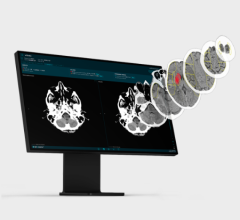
Graphic courtesy Pixabay
Siemens has long focused on automation as a way to make diagnostic equipment faster and more efficient. Artificial intelligence (AI) is the latest tool the company is leveraging to do that, according to Wesley Gilson, artificial intelligence lead for Siemens Healthineers in North America.
The company’s early focus on operational aspects of AI, however, is part of a longer-term approach that Gilson and the vice president of Siemens’ digital services business in North America, Peter Shen, plan to describe on July 21 at The Association for Medical Imaging Management (AHRA) annual meeting in Denver. The objective of their talks, scheduled for a Siemens-sponsored exhibitor symposium will be “to educate our audience on artificial intelligence,” Gilson told Imaging Technology News. To tell the audience “where we see AI making an impact in health care particularly in radiology today and in the future.”
Siemens looks at AI, he said, as a kind of continuum — one that can be addressed through “a tiered approach.” Fundamentally the company is leveraging AI to make its radiology equipment generate reproducible results faster. Such operational improvements could bear early fruit, boosting productivity by speeding up clinical workflow; preventing diagnostic errors; even reducing missed billing opportunities, according to Gilson. In this way, AI might help the company achieve long-held objectives, including increased efficiency and accelerated diagnoses.
“Having those touch points in the early stages with regards to automation, operational reproducibility — those are small targets that you can hit,” he said.
Aiming at Small Targets With Artificial Intelligence
Siemens is focusing early on these targets not because they are easy, Gilson said, but because doing so might produce benefits for clinicians and patients in both the short- and long-term. Siemens is looking into questions about “how we can acquire data faster and acquire (them) more reproducibly; how we can then take that data and be able to draw conclusions (from them),” he said. The answers could ultimately make radiology more precise.
Greater precision may also come from increased consistency from one scan to the next — a natural byproduct of the standardization of imaging. Through the improvement of day-to-day operations, AI could have a huge impact, Gilson said. Over the long haul, this impact could broaden, if AI makes radiology even more data driven. “Radiology is already data-driven, but AI may take it to the next level with regards to its ability to draw even more and more information out of the data that is being collected,” he said
Eventually AI might make prognostic risk scores increasingly meaningful, he said, explaining that smart algorithms might see patterns in data about disease progression that people alone could not recognize. “There is great optimism that AI will be able to help us understand disease processes,” he said.
How AI Might Extract and Use Medical Data
The underlying concept is that AI might be used to extract information from the ever-growing amount of healthcare information being collected both for individuals and patient populations. This information then might be used by physicians to assess patient prognoses in terms of risks and by patients to influence their futures for the better.
Eventually, AI could help integrate diagnostic radiology into the clinical decision-making mainstream. But Gilson advises caution.
“Once you start moving into the space of interpreting the data, that is where it starts to be a bit of a controversy,” he said.
Greg Freiherr is a contributing editor to Imaging Technology News (ITN). Over the past three decades, he has served as business and technology editor for publications in medical imaging, as well as consulted for vendors, professional organizations, academia, and financial institutions.
Editor’s note: This article is the second piece in a content series by Greg Freiherr covering The Association for Medical Imaging Management (AHRA) annual meeting in Denver. The first article, How Standardizing Protocols Can Save Time and Money, can be found here.
Related Artificial Intelligence in Radiology Content:
VIDEO: Editor’s Choice of the Most Innovative New Artificial Intelligence Technologies at RSNA 2018
VIDEO: Technology Report: Artificial Intelligence
How to Market Healthcare Artificial Intelligence Software
How Standardizing Protocols Can Save Time and Money
Technology Report: Artificial Intelligence
PODCAST: How to Make Artificial Intelligence a Success in Medicine
PODCAST: Radiologists Must Understand AI To Know If It Is Wrong



 February 05, 2026
February 05, 2026 









